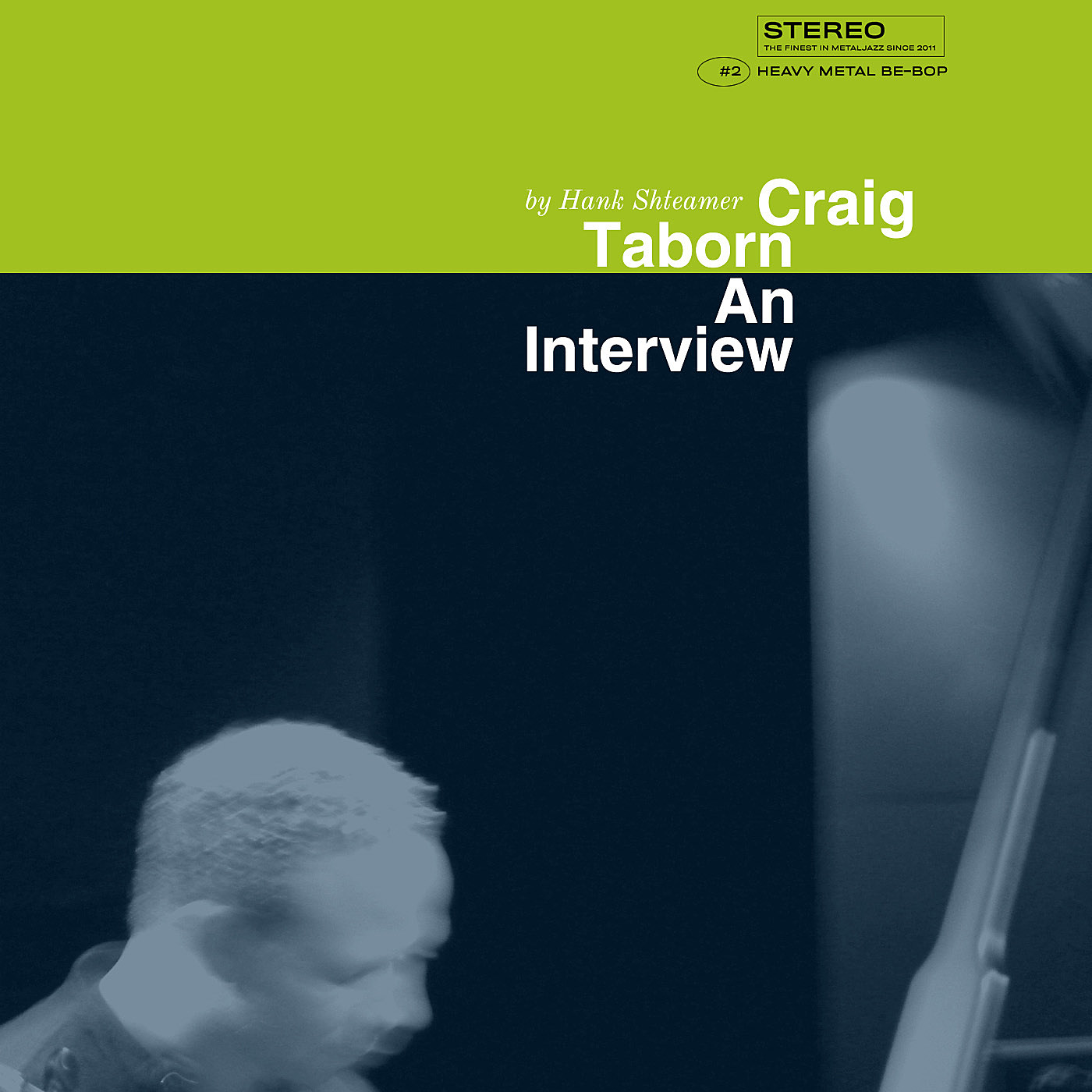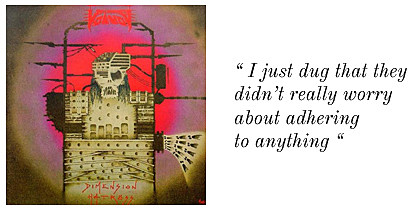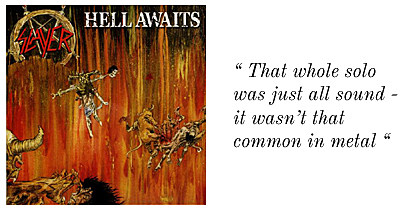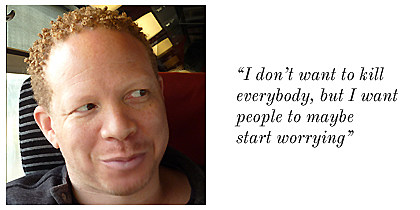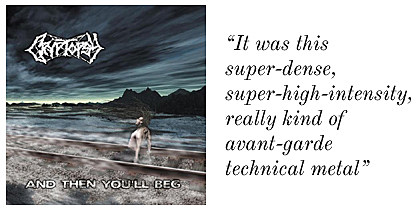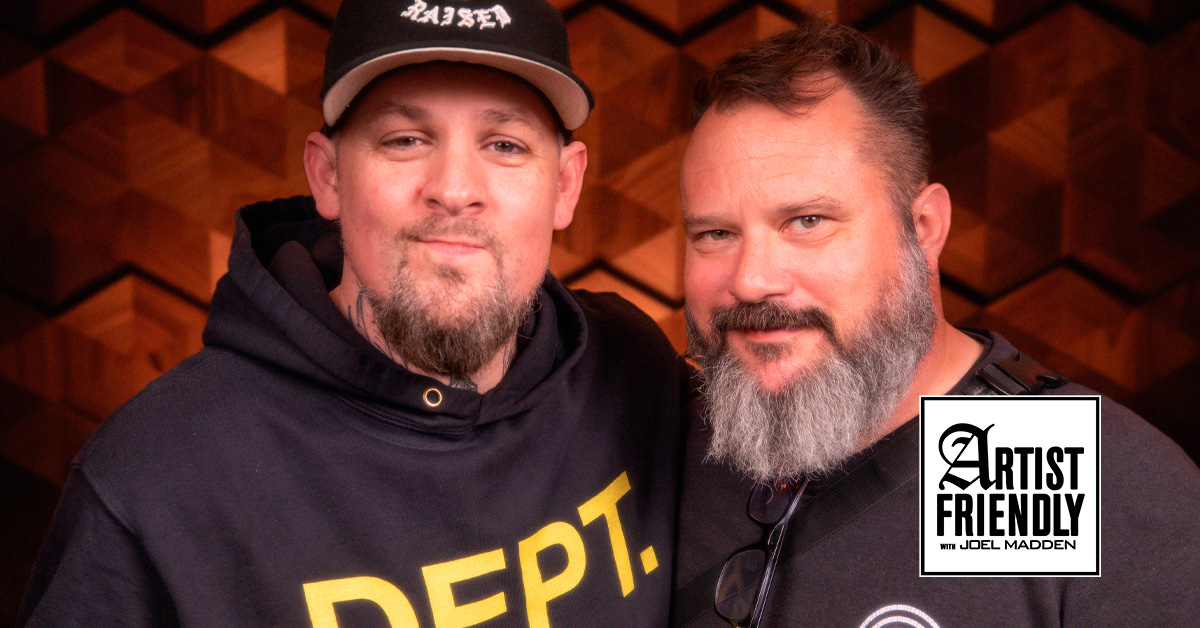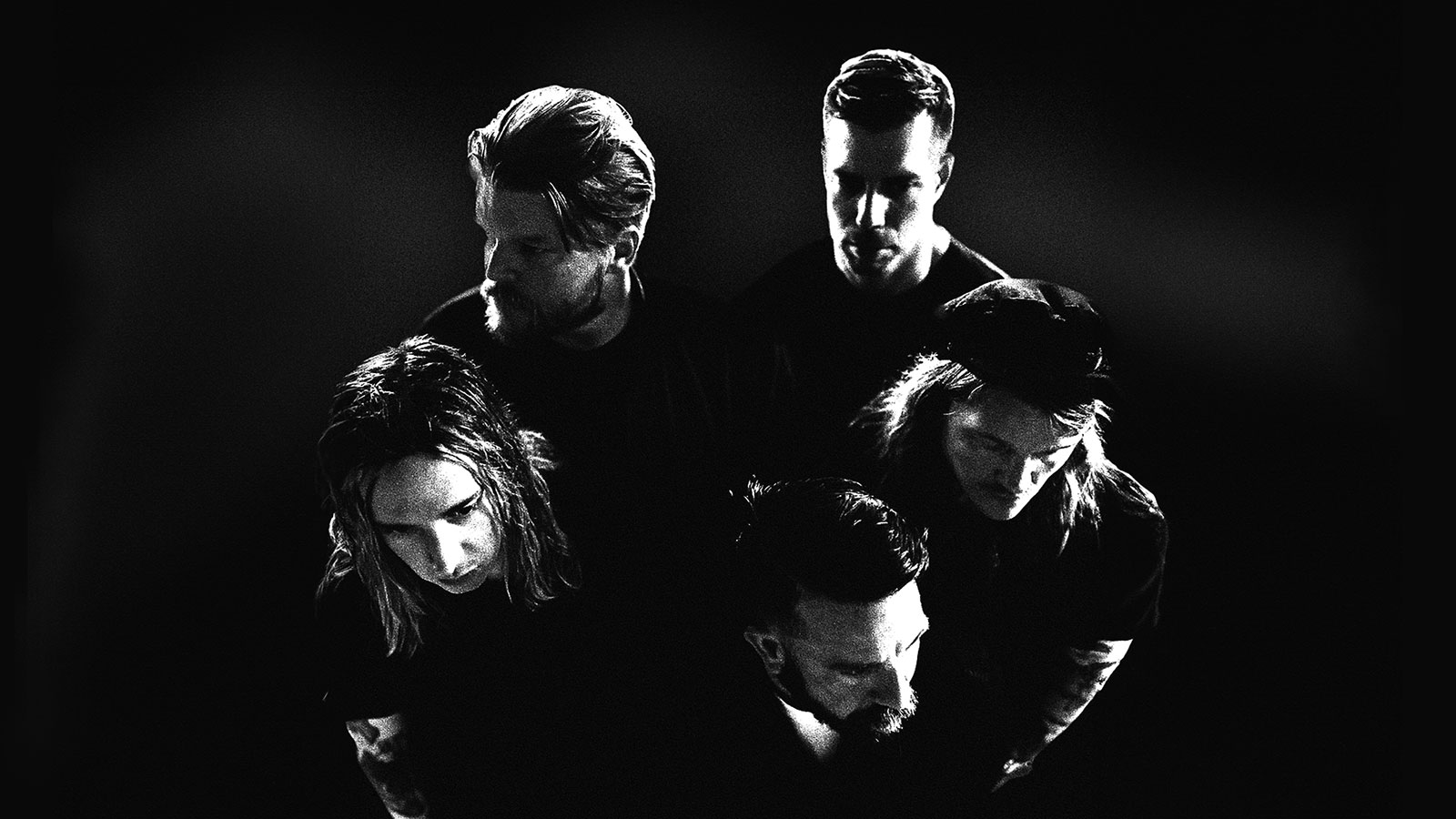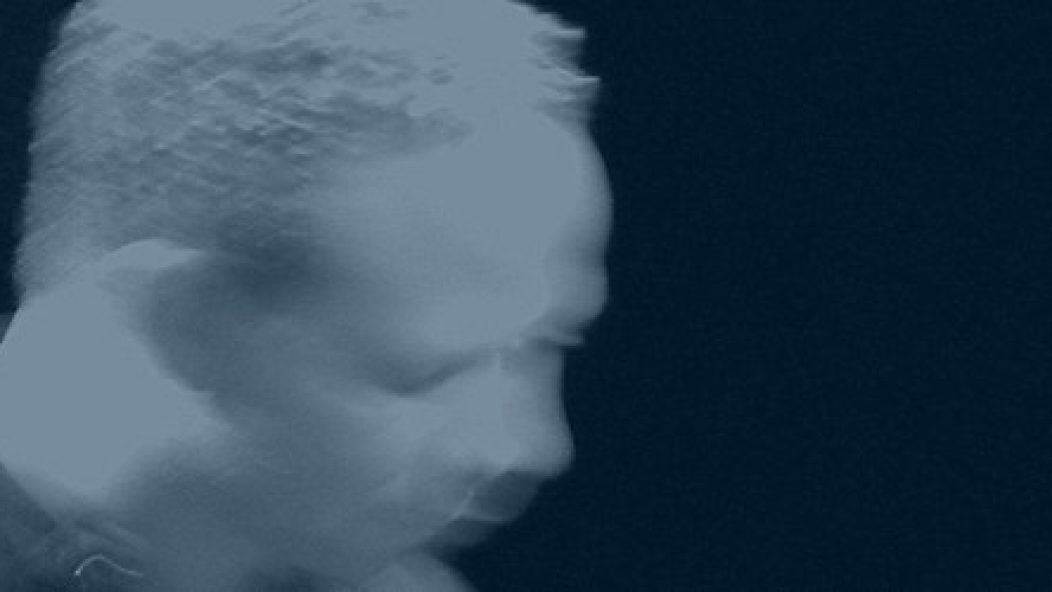
Heavy Metal Be-Bop #2: Interview with Craig Taborn
. . .
INTRODUCTION
. . .
Welcome to the second installment of Heavy Metal Be-Bop, an interview series that addresses the intersections of jazz and metal. (See first installment here.) My guest is pianist Craig Taborn, one of the main inspirations behind HMB.
Prior to 2009, I had known Taborn mainly for his jazz playing, especially his dark, steely synth work in the Tim Berne project Hardcell (a great example is The Shell Game, from 2002). But a 2006 album by the Gang Font, a punk-fusion quartet with Hüsker Dü’s Greg Norton on bass, tipped me off to Taborn’s broad range of interests.
The plot thickened in early 2010 when Taborn booked an NYC duo performance with Steeve Hurdle, the avant-metal guitar wizard from Gorguts’s Obscura period and the satellite project Negativa. Unfortunately, the Montreal-based Hurdle didn’t make it across the U.S. border (work permit issues), but I made a mental note to get in touch with Taborn and pick his brain about the jazz/metal connection. After spotting him at NYC shows by the Jesus Lizard and, not surprisingly, Gorguts and Portal, I wrote him and we started discussing metal via email.
Even amid his more unconventional pursuits, Taborn’s jazz profile has continued to grow. In the last year alone, he’s appeared on Roscoe Mitchell’s The Far Side, Gerald Cleaver’s Be It As I See It, and Chris Lightcap’s Deluxe. He’s also been prepping his all-acoustic solo piano debut, Avenging Angel, which comes out June 7th via ECM. Title aside, there’s nothing too metallic about the album, nor is there anything very jazzy. Each of the 13 pieces feels like a meditation, graceful and measured, spiked at times with choppy turbulence and dancing groove. I’m currently on my fifth or sixth listen to Avenging Angel, and I can feel it becoming an obsession.
Last month, Taborn and I met to talk and listen to some music of his choosing. It quickly became apparent that he was one of the most scarily knowledgeable metalheads I’d ever met. We discussed his upbringing in the ’80s Minneapolis scene, how his listening tastes can alienate him from his fellow jazz musicians, why Mike DiSalvo is his favorite Cryptopsy singer, the pleasures of listening to Slayer at 33 1/3 RPM, and much more.
. . .
INTERVIEW
. . .
Where did your interest in metal begin?
It was always there. I was never, like, a metal guy, in the sense of whatever that means in terms of subculture. I didn’t wear black. But I was always into metal from a young age. It was just something to be into, in the northwest suburbs of Minneapolis. You know, the basic deal: I’m of the ’80s. More underground or extreme metal stuff I got into pretty early. I saw Metallica with Cliff Burton, so I go deep back into that underground thing. I was 13 or 14, and I remember that show made an impression, because it was an arena show. Who were they opening for? It was something huge. The first thing I noticed is that they were really unprofessional in a fun way. It was great musically, but they were just joking around.
But I was into all kinds of music, into going to shows. And a good friend of mine had a fanzine, and he was into metal, so I used to go to a lot of, whatever you’d call it, underground metal [shows]. I saw Slayer back then… I remember I got Hell Awaits when it came out. That kind of stuff. Megadeth, Voivod was big for me.
I was into the basic, generic metal that was popular with everybody, but because early on I was into jazz, I was into contemporary classical, like avant-garde music. And at the same time, the metal kind of coincided with punk and other underground noise-scene stuff that was going on, and it wasn’t cool to like other things. But because I wasn’t part of any of those subcultures, I just kind of went to see shows. I saw a lot of early punk, like I saw Minutemen two or three times before D. Boon died. And, of course, Minneapolis [had] Hüsker Dü, and there was a hardcore scene there. But back then, [punk and metal] was not at all related.
What year did you leave there?
I went to University of Michigan in ’88, so I was in Ann Arbor and Detroit. For me, the metal stuff was early. I was listening to metal when I was, like, 12, like Maiden, and I was really into Venom – darker, more extreme stuff. And, of course, ’70s stuff like Sabbath, but that’s sort of almost [a given] if you’re into that kind of stuff at all, the obvious things. Zeppelin was early, that kind of hard rock, and Sabbath, and then I got into the more extreme stuff, but it coincided with me getting into more edged-out, extreme versions of everything. And because of the all-ages shows, I’d just go see whatever was coming. Most of my friends weren’t into metal. They were into more punk stuff, ’cause metal was the longhair thing.
So the punk/metal divide was…
It was huge in the ’80s. Punk-metal [crossover] hadn’t happened, or it was just happening. So it was a big thing. I didn’t have long hair. And there was that clash of hardcore kids versus metal guys. It wasn’t that dangerous, but there was this idea that they were two completely separate things. And then everybody [crossed over] – that was that generation. Like all the hardcore bands started growing out their hair.
Black Flag…
Yeah, exactly, and then it got into the doom thing. All that stuff was happening at that time, and Metallica. But I would go to metal shows, too, with all metal guys.
So was your jazz interest blooming at the same time?
Oh yeah, totally, very much so. I play piano, keyboards, so it wasn’t a very metal instrument. I was into rock and guitar hero kind of stuff when I was 12 or 13, but I realized that – Keith Emerson aside – there was more interesting stuff for my instrument in jazz. And my dad listened to jazz, too, but I just remembered making this equation: “Jazz pianists have more stuff to do on the instrument”. That’s what attracted me to listening to more jazz.
. . .
Craig Taborn – Live Piano Improvisation
. . .
So you were committed enough to the instrument that you didn’t say, “I want to play rock or metal, so I’ll pick up guitar”?
I didn’t. I don’t know why. It would have been a logical thing, but for some reason I was attracted to the piano. And right around that time I was into electronics, like synths and stuff. It came easily, I think, so I liked playing it, but I never thought I should pick up guitar or play drums.
You were saying that you were interested in the outer reaches of various genres. When you got into jazz, were you looking for that same sort of extremity, or were you looking at it as just a different area altogether?
I’m not sure exactly. This is still, like, [at age] 12 or 13, so I’m not sure what was happening. I mean, my dad listened to hard bop, so I got into that, but I got into Stravinsky and stuff like that just as a sound. And then [for] the extreme jazz, it was just the public library and getting into a lot of AACM guys. Someone had bought reams of really experimental stuff from the late ’60s and early ’70s, and I would just take it out and take it home, and it just puzzled me and excited me. One thing was that everything looked good. You’d get an Anthony Braxton thing and, you know, the diagrammatic titles and liner notes and stuff like that, and I was like, “I don’t know what this is, but they do, so I’m just going to check it out”. So all that kind of geeky stuff was attractive. I remember at first not really knowing what was going on, but being attracted to the idea that there was something going on that I didn’t really know what it was.
I got really into the idea that there were all these ways of making music and all these different approaches and sounds and aesthetics. And I got into the idea that all these different people really heard things in a different way, like what that could yield, how far it could go. So I kept seeking it out from that age, and quickly I realized the fringes existed.
I think the biggest thing for me was, I made this equation that there was something relatable about the avant-garde in all these different styles, which was that, although they were different things, there were a lot of things that they shared in common more than their center stylistic threads. Like if you listen to Art Ensemble, something from Fanfare for the Warriors, a lot of the sound, intensity, even the note choices was similar obviously to contemporary classical things. But also extreme metal was starting to get more dissonant, especially something like Voivod, moving toward polytonality or atonality or whatever that means.
Was Voivod a gateway?
Personally, I was just really into Voivod. They were a gateway into everything, ’cause for me they were a unification of a lot of things. There was a relationship between the early Voivod stuff and Die Kreuzen, which was a Milwaukee hardcore band that extended hardcore in a way, and they really sounded similar, and I know Voivod was into Die Kreuzen. So I was like, “OK, weird, experimental hardcore is related to this”.
The thing about Voivod was they really unified [things], like every Voivod song is almost a little mini-compendium of a lot of different styles and subgenres at the time. In one thing, they’d have something that would go into something that sounded like Black Flag or like Die Kreuzen or Slayer, and then the blastbeats were there, and it had that kind of New York thrash thing in it, and I just dug that they didn’t really worry about adhering to anything. And then they started getting steadily more progressive. I got into them around Killing Technology, which was when it started going [progressive], and then Dimension Hatröss, and that’s still one of my favorite things of all time, ’cause it was just like, “What is this???”
That kind of genre-defying is the thing that I’m attracted to across the board. I didn’t feel like it was a fusion concept, but they would just throw in anything to make their music, from a certain perspective. It was really weird to hear that. It was like, “Wow, that sounds like this thing and that sounds like this thing”. And you’d hear these punk rock references, right alongside the metal thing, but it wasn’t this obvious thing, like (in a nerdy voice), “We’re punk-metal”.
Slayer was as much that way in another sense. All that diminished stuff or those atonal lines… When Hell Awaits came out, I was like like, “Oh – that’s interesting”. That kind of sound wasn’t happening [much in metal]: lines instead of riffs. Not the Iron Maiden dueling solos all the time, but really interesting lines. And just exploring structure.
And then, of course, Metallica – it had that proggy element, that nerdy, proggy, technical thing that I was attracted to, ’cause I was into progressive-rock stuff, too. But the thing immediately that I noticed and liked was that it was heavier. For me, I was like, “Of course, that’s what you’d want to do”. At the time it was like, “Oh, it’s almost like something like Yes, but a lot more intense”.
. . .
I met with Dan Weiss last week, and we talked about thinking of …And Justice for All as a prog rock album, just like you’re saying – like the heaviest elements of Yes or Rush…
Voivod was really Rush-ed out to me, but in all the good ways. ‘Cause Nothingface was pretty cool, and then when Angel Rat came out, they really tried to go Rush, and I wasn’t as into Angel Rat, so that’s when I stopped. I was like, “I can’t deal with this”. (Mock-exasperated) ‘Cause they tried to sing and…
I actually like that album.
No, it’s cool. It got bland after a while, but that was a cool departure.
Well, that was that time, too, ’cause all those extreme guys, I remember reading interviews where they were like, “I just want to get away from the technical and explore groove”, and that’s what happened with Metallica. And a lot of those bands had outgrown that extreme adolescence, which is appropriate. But some of my affections for metal have to do with it having a sort of adolescent thing to it. What I mean by that is, not just in terms of outlook, but the fact that at that stage, those identity things aren’t formed, and it’s just a more freewheeling exploration. The reason it can go there is because nobody really gives a shit, and it’s like, “I’ll just try this thing”, and sort of just willing to go for it. And like hardcore, all that stuff exists in a beautiful space there for a moment, and then it usually passes.
The metal scene is incredibly conservative. But there’s something about the terrain defined by that identity that allows for people to try to break out of it. So you get something like Meshuggah, you get something like Gorguts – these bands that apply something to their metal identity and that extends it, whether it’s like, “OK, we’re a metal band, and we’ve done a couple of things that are genre-specific, and we’d like to try something”, whatever that may be. If they’re into some kind of orchestral [music], or they’re into jazz, whatever it is, then they’ll just try to throw it in there. That’s what makes that metal stuff interesting to me, much more interesting than people trying to “do” metal. I tend to not be into people doing metal, as a style, people from outside of metal trying to do metal – I’ve never been really into that. I’m into metal guys doing things. But all that could be said for any type of music. I don’t like people going in and trying to appropriate from outside. It’s not of the thing; it lacks that vibe.
. . .
. . .
I read an interview where you were talking to Nate Chinen and touched on this. I think you had brought up the punk/metal thing on one hand and the jazz on the other, and Nate had asked you how you reconcile them, and you said, “The strategy is to not reconcile them”, and then you were talking about the cosmetic aspects of these styles.
When I think about jazz and metal, the first things I think about are bands like Naked City or Painkiller, and I think in a way, maybe those are the less interesting things, because they’re the more obvious things, the more 1+1, like self-consciously melding these things. I remember you’d said that you weren’t as interested in playing “jazz with distortion” as you were in exploring some of these ideas in your acoustic piano work. Is that accurate?
Yeah, definitely. I’m not into style at all. I’m just not into the idea of style as something to be considered as salient in creativity. I don’t really think that way about it. And it does become cosmetic. It’s like (dopey voice), “Oh, metal – that means distorted guitars and…” All these trappings, which make it on the surface metal, but without a certain ethos, they lack any sort of power. I mean, I wasn’t a metalhead in that sense, like being part of the thing. I’ve always been attracted to maybe the more extreme or sort of genre-defying groups. But at the same time, I have a genuine affection for and interest in metal as a thing, or punk rock, or hardcore and its roots. So I listen to metal bands that are very genre-specific and don’t break too much out of that. Because I like the juice that that has, and that’s why I like bands that are obviously coming from that who change what they’re doing. But just tinkering with those stylistic things, it’s just not that interesting to me. It may tickle your fancy for a couple seconds, but it’s hard for that kind of thing to stand the test of time. And that’s true with jazz, too.
In deference to Zorn, I think that there are a lot of genre-slamming experiments going on. I think that with Zorn, that was so much a part of the compositional raison d’etre for him specifically in the ’80s. I like Naked City because it was part of a larger body [of work]. Someone might say, “Well, that’s what Zorn was doing [coming at metal from an outsider perspective]”. But for him, I always got the sense that that type of thing was intentionally exploring a flat tableau. It was much more collagist. That’s a little different to me than fusions. I don’t think Zorn was ever doing any fusions in that sense. It was much more the opposite of a fusion. It was just slamming things up against each other. Now you can say it’s effective or not effective, but I think its whole purpose was different than a genre-based exploration. In that sense, it was operating outside of identity. I saw early Naked City shows, and it was that schizophrenic, radio dial kind of thing that he was doing all along. He’s been doing that for a long time, with all different kinds of music. I don’t want to say it wasn’t deep, but [it was] maybe a little thinned-out, maybe more of a pastiche in order to create a different compositional thing.
It’s like a caricature.
Yeah, yeah, and I think it almost needs to exist that way. It would be weird if it got too deep into certain styles or genres, ’cause then the tableau changes. So that was a little different. In a certain sense, some of that was effective, and that certainly had an impact on tons of metal guys. Naked City, in particular, I know was [a] big [influence] on Gorguts. Talking to Big Steeve [Hurdle], anyway, who was part of Gorguts during Obscura – Zorn’s one of his heroes. Even Dillinger Escape Plan, all that stuff – that sound was like, “Oh yeah, they listened to Naked City”.
. . .
I think one thing that Naked City does, above and beyond the music, is that once a self-consciously arty, “composer”-type figure puts his wand on metal, all of a sudden metal can be tweaked around and thought of as an art music, and it’s a gateway for people. [It’s like] the way Sonic Youth is for people: they’re into rock, and that opens them into jazz. For the jazz people, Zorn opens them up to metal or vice versa.
No, it’s true. I don’t know what I think about that. There’s a part of me that isn’t so [approving of] the benediction of some more arty guy that [says], “Now metal’s cool”. I’ve never been into that, because I’ve been into metal all along. So, like the people who flow in, or the people who are like, “Oh, Meshuggah’s great, but that’s the only metal band [I like]” or “I don’t like the screaming”. I’ve had a lot of jazz guys say that, and I’m like, you know, “Fuck you – don’t listen”.
I think Meshuggah’s great; I think it’s a very specific and unique statement. It’s not the only metal that’s out there, but I know a lot of people who only [listen to it] because it appeases enough of their sensibility. But, you know, there’s all this stuff out there to listen to. And I’m like that with anything, going the other way too. Like the metal guys who are like, “I don’t really listen to jazz, but I like Zorn, and Zorn’s jazz”. And I’m like, “Well, he’s great; there’s a lot of things he does that are great. But there’s a lot of other stuff”. But that’s just from my position, growing up and always being into all this stuff at the same time. So I’ve always [disliked situations] where it’s just, “Okay, this is allowable now”. I mean, I like hardcore old Detroit techno; I don’t care about the IDM-y stuff. It’s like, “Oh yeah, I like electronic stuff, too: I like Aphex Twin”. I’m like, “Well, I like Robert Hood”. I like Aphex Twin, too, but there’s some stuff that gets deeper and is more fundamental and still has that weight to it.
But at the same time, I have to say, the cross-genre, cross-stylistic interest also can be really interesting. In, like, ’98, I played in Chicago with Roscoe Mitchell. It was one of the first gigs I did with him, and there were these guys in the audience who were just into it, but they were metal guys, like really metal guys. They weren’t, like, postcollegiate hipsters, like, (nerdy voice) “Oh, we like metal”. These were just metalheads. And for some reason, they came to this Roscoe Mitchell show, and they loved it. It was really intense. It was the Note Factory… that thing gets full-on high intensity for a long time. So they appreciated that. They were just into how intense it got. I was talking to them afterwards, and they were into it, and I was asking them what they were into, and then one of them said, “You should check out Gorguts’ Obscura – you would like that. That shit’s crazy – you need to get that”. And I got it the next day.
But these metal guys thinking about Roscoe Mitchell – that’s a really far divide. ‘Cause a lot of metal guys like technical jazz; they like fusion. They can go there, but extreme avant-garde… for some metal guys, it’s just too [much].
I think it might be a rhythmic thing.
Well, it’s tightness and precision. They don’t like that chaotic aspect of, like, “free jazz”. But then through something like Last Exit or Naked City, something Zorn-related, they can go to it that way.
. . .
. . .
I know you met Steeve Hurdle and played with him. How did you get into Gorguts?
There are a few metal albums that really intrigue me, and Obscura was one because it kind of came out of nowhere for me. That was such a weird little blip when it came out. Nobody knew what it was. It was too out. A lot of metal guys hated it. It was all wrong. The doom thing wasn’t big, and it had these things that were super-slow, and everybody hated that. Not everybody – obviously people liked it. But it was so dissonant and so dense; it was like Beefheart-metal.
It’s fascinating. Like Cryptopsy – I was into Cryptopsy specifically in that period, which everybody hated ’cause Lord Worm left, and they had Mike DiSalvo, and he was like this hardcore guy. That’s what I liked about it, because it was this super-dense, super-high-intensity, really kind of avant-garde technical metal. You could barely tell what’s going on half the time.
What are the Cryptopsy records that you like?
Whisper Supremacy and And Then You’ll Beg, the two with Mike DiSalvo. I know a lot of people don’t like it, but I liked that “Boston hardcore dude barking over it” thing. It was like a monster-truck-rally voice over that. I still think that’s great. I like those two records, ’cause they were as technical as they were gonna be. They just decided to ramp it up: almost no groove, everything intense structure. And they’ve just got this guy ranting over it, barking over it. It was, like, a Henry Rollins–style hardcore guy. It wasn’t stylized, and I was like, “Oh, that’s weird”.
[Likewise with] Gorguts, for instance, it was just the combination of elements. There’s so much compositional stuff in there. I couldn’t hear it at first, but I was like, “This is out”. Besides groove, I’m really into the structured drum thing, the written drum parts that aren’t just blastbeats. That’s what Voivod did in a certain sense, but with Gorguts, it’s really structured parts that’s as much a part of the melody. I remember I got [Obscura] and then brought it back here, and my roommate had a nice stereo, [and] all of a sudden I heard the parts for some reason. That’s like when you listen to Trout Mask Replica, and you start isolating the sides, and you start to be like, “Oh, that guitar’s doing that, and it’s really specific, and then the other guitar’s doing that, and it’s really specific”. I was like, “Holy shit, this is all organized”. It’s that kind of revelation where you’re like, “This mess is actually written.” (Laughs)
I know what you mean about the drumming on Obscura. The blastbeats are used like little cells; it’s not just hammered out through the whole song.
Right. That’s one of the things I got into with Voivod earlier, even though it’s not quite as fully exposed there – blastbeat development, like the way the rates would go. The blastbeat is such a great musical addition because it creates drones at different rates, and to a large extent it functions as a drone, ’cause at different rates, it’s just low-frequency pitches. It creates all of these different layers. And I was into that with Voivod, but I like the broken-up, sculptural way it existed particularly on Obscura.
Like I said, it was around ’97 that I got it. I saw the [Gorguts] tour in ’98, and that was intense. That was with Cryptopsy. And then I saw them again in 2000-whatever. I think that was at Coney Island High. I could be wrong, but I don’t think I am.
A couple years later, MySpace popped up and I saw [Luc Lemay of Gorguts] was on MySpace, and then I saw Big Steeve and I wrote to Big Steeve, and he responded and we were just talking, and he’s a nice guy. I don’t know how it developed, but we just started doing stuff on MySpace.
So a couple years later, I went to Montreal with Dave Binney’s group with Dan Weiss and Thomas Morgan, and I wrote to [Steeve] saying, “We’re coming to Montreal if you guys want to come out”, and at that time, it was when he had started Negativa. I’m gonna say this was 2005 or 2006. So we went and played this place with Binney, and Big Steeve and everybody but Luc from Negativa [attended]. So Miggy, who had played in Ion Dissonance and was in Negativa, they all came to see this jazz thing and they loved it. And they were all open. So that’s when Dan and me met him. And at the same time, he had been talking to Dan, too. So Dan had gotten into it, and he had written. So there was a certain peer-fan “I really like what you do” [interaction]. And at that time, especially for Steeve, it was such a null point, because he hadn’t played in Gorguts since that tour, and he was like, “You even know who I am? Why would some jazz guy from New York be into this?” It was just fascinating. So it developed from there, and then whenever I got to Montreal, I’d try to get in touch with all those guys.
. . .
. . .
Toby Driver [of Kayo Dot] had contacted him the same way, and Toby saw that I was in communication with him, so that thing happened last year, which turned into a debacle. Toby had seen that we knew each other, and he wanted to have Steeve come for his Stone month. [Driver curated a month of events at New York City’s The Stone last year.] He invited him to play solo, and then he had the idea, “Would you wanna do something with him?” And then they asked us, and I was into it. They didn’t know what it would be.
It was booked a year in advance, and I went up the week before. It was planned as an improvisational event, and I was into doing whatever. I even said maybe Dan could do it with us. And Steeve was like, “Wow”. He’s not an improviser that way. Actually, as it turns out, he’s a good improviser, but he’s not used to making music that way. So he was sort of just like, “Whoa, what is this going to be?” But he was into the idea.
He said, “Maybe we could get together sometime”. But it didn’t manifest until I actually did a gig with some guys in Ottawa, some Canadian guys. And I almost [booked the gig] knowing this, and it turned out it was, like, the weekend before [the Stone show]. So I drove over to Montreal the next day, after I did this gig, and got together with him. And we just kind of played, worked through some strategies, just sort of got a sense of what could happen. But he was into the idea of improvising. I had told him over the course of the year, “You could do something, make something and send me the tapes.” But he wasn’t into that. There’s that process divide, too. It’s a whole different way of putting together music. Like, one rehearsal is absurd; you’re supposed to rehearse for years with the band to get the music together, where I [just said], “Send me a tape, and I’ll just learn this stuff”.
So I went up there, and we spent an afternoon, and it was really fun. I mean, he does all his shit! That vocabulary is such an avant-guitar vocabulary, and he really brought that to [Obscura]. It’s like the Fred Frith (imitates sewing-machine-style Obscura guitar technique)… And he started with something more melodic, and I was like, (unenthusiastically) “Yeah…” ‘Cause he was thinking, “Jazz guy – I gotta know some chords”. And I was like, “You know what? Don’t think of me that way. Don’t think of me like ‘jazz'”. He was like, (sheepishly) “Yeah, I only know a couple chords…” He didn’t know what to expect from me. And I was like, “Let’s just work with sound”. ‘Cause he has all this stuff, so he started doing all that (imitates Obscura-ish guitar), and it was great. It was fun. I was excited, and you know what happened?
He got turned away at the border?
He got turned away, ’cause he was just coming down, ’cause it was just the Stone. So he was just trying to come in without having any paperwork. But the thing is, he probably said, “I’m just coming in to not play any gigs”, but then they Googled and, of course, it just popped up, ’cause the Stone has good Google visibility. [HS: My Time Out New York preview probably didn’t help!] That’s a big problem for all of us, going both directions – Google was the enemy. Trying to play without paying, like, a $500 visa, to play a gig where you’re gonna make, like, $24. (Laughs) So that was a drag. He was excited; I was excited.
I saw that show on the calendar, and I wouldn’t stop talking about it.
What we did was fun, you know. It was really cool, and I was looking forward to developing it, doing something – even if it was just correspondence. But the thing that hit me was that his thing is really strong and defined, and it was really cool to watch .
It almost killed me. That was the other thing: We were in the studio, and he had his stack. I play a lot of loud things, so I wasn’t really too worried. And he said, (laughs) “I don’t want to hurt you – is it OK?” And I was, like, “Yeah, just turn it up. Get your sound; do whatever you want”. And I was like (laughs), “Holy shit, that’s loud!” But it was so great once we got into it. My enthusiasm for his stuff was in there, just because I [had] listened to so much. He was at a disadvantage, because he had no idea what I do, and I’d listened to his shit for over 10 years. So it would be like (imitates Hurdle guitar) – I could tell what he was gonna do, because it was Steeve. There’s a certain way he thinks musically. I wish that [show] had happened.
. . .
Another thing I wanted to talk about was the intensity of your playing. When I saw you with Chris Lightcap at Winter Jazzfest, you get into this really frenetic playing, like a player piano going crazy, and I’m wondering if in times like that, or at all, do you ever think about metal when you’re improvising?
Oh, all the time. Yes, absolutely. Not so much as style, but as projection of sound or attitude. I definitely think of the attitude of metal or punk rock or something, or hip-hop or things like that.
There’s always the polite jazz “Okay, we’re gonna do this thing and generate some energy”, and there’s sort of this ceiling for the jazz way of doing it. It’s like, (mock-cautious) “It’s getting intense”, and then the intensity is built up through performative activity, like the drummer is playing some hip shit, or everybody’s playing some hip shit. They try to drive the energy through this kind of content, but it’s performative content. It’s like, “Look what I’m doing on my instrument”. And, obviously, there’s a lot of room for technique, speed-chop guitar solos in metal.
But the thing that I’m attracted to in metal is the visceral [feeling]. There’s points where I feel like I want to just aggress with [playing], so I’d rather push it through that way. And really, I’m thinking, “I just want it to get uncomfortable”. I want that power. Because the cool thing with rock is the danger aspect, that feeling of aggression and power. You want to project that. And I definitely have that going on sometimes, especially in certain contexts where it’s maybe inappropriate. If I feel that jazz [has] this school shit going on, like (mock-impressed by technique) “Oh, he’s so great!” kind of shit, I just want to undermine it with something that’s really [opposite]. And that kind of power stuff like that is more useful for that. So just like (mimics thudding low notes), and it’s like, (mock-dopey) “Anybody can do that”, and I’m like, “Yep”. It gets that energy, so it kind of undermines the instrumentality. Even in terms of volume with a certain thing, I like to maybe get it past the comfort zone a little bit – or a lot. I don’t take it as loud. I don’t want to kill everybody, but I want people to maybe start worrying.
I remember when I was talking to you at Winter Jazzfest. You were standing with Chris Lightcap, and you brought up Gorguts and it occurred to me that you being into this stuff kind of alienates you from other jazz musicians. Obviously, Dan Weiss is an exception. Maybe I’m being overly presumptuous, but it seems that this area of interest is not shared by a lot of people you’re on gigs with.
Yeah. More now, obviously – more now, the younger guys, ’cause everybody kind of grew up with certain things. But, yeah, not fully and not maybe to the same extent. (Wearily) Because everybody likes Meshuggah. You know what I mean? (Laughs)
It’s like saying you like Björk.
Yeah. It’s like (excitedly), “Yeah, have you heard Meshuggah?!” And I’m like (flatly), “Yeah”. But there’s so many other things, and when you start going in, it’s like, (mock-dopey) “Oh, you really like this stuff”. Like, “Yeah, yeah I do”.
I’ve been that way for so long in that world, it’s sort of part of my identity. It’s less alienating, but in a way, the alienation’s already happened. People sort of know that I’m into a lot of different things, so they respect that. But I don’t think they always understand it or always approve of everything. With the jazz guys, as long as it’s technically proficient, they’ll like it. But if you go for more raw stuff, they can’t go there. But I like to go there, because that’s where it lives. So that’ll freak some people out. I’ve had some interesting conversations on the road. I think some people think it’s just a posture or a novelty: (Mock-condescending) “Oh, he just likes to look kooky”. It’s like, “No, I actually do like this”. (Laughs) I remember that conversation with somebody. He’s like, “You like…?” And I’m like, “Yeah, I actually like this stuff”.
. . .
. . .
When you were talking about the danger of rock, I remembered that I’d seen you at the Jesus Lizard show.
Well, yeah, [danger is] what makes rock fun, like something to go see. And that moves into an element of theatricality or just sort of the projection of the music. But that’s existed in the jazz [world], too, and that’s what it sort of meant for. There’s a sort of virile male-power thing in bebop that it’s lost because everybody’s coming out of some music school, and they’re just showing what they can do on their instrument, and you know that they’re a dork. Jazz used to be sexy, and it used to have danger.
I get a little twitch if [jazz] gets too much about nerd-gratification stuff, if it’s too much about “This guy can really play”, if it’s too much of an expo kind of thing, if it’s too performative, because it reduces the aesthetics. It reduces how you can read the music and all that stuff, because it only means this guy’s playing over this thing really well. And it functions that way for a lot of people, it’s like, “Oh, wow, I’m gonna go watch this person, because he’s really great”.
A whole sector of metal is fully about that. That’s all they want to see, and that’s the whole thing. The thing that saves it is I’d rather see it in metal than fusion, because in metal, at least, it has this other aggression thing. But I’d way rather see Meshuggah do something complicated than I would wanna see some fusion guys do it, because it’s just totally limp.
To me, Mahavishnu Orchestra is the crucial exception, because that music had a lot of balls.
Well, yeah, fusion before it was fusion. When I say “fusion”, I mean what happened after that. All that stuff early on, the early Weather Report – that was something else, ’cause that was jazz guys just kind of bugging out. I guess it had a commercial concern, but they weren’t thinking about it the same way. They were coming out of something really intense.
Yeah, it’s ugly music. Stuff like The Tony Williams Lifetime is very brutal, with the distortion and the keyboards.
The people who I’ve talked to who’ve seen that [band] still say how that was loud in a way that metal shows now are loud. I’m into that. But when I say fusion, I’m speaking of the ’80s-into-now variety (laughs). And I’m not even against all fusion; I just mean a performative ethos that is about… ‘Cause it gets so thin! (Imitates noodly electric bass) And I can even go into the progressive metal, melodic type of thing, like some Watchtower sort of thing. I just think it’s funny. That’s not putting those guys down. It’s not really my thing, but I’ll assay it. Like Zero Hour or something like that with the (mimics high, operatic vocal style), but I’m sort of like, “OK, that’s a thing”. But that (imitates noodly electric bass) – I just can’t do it.
It becomes completely divorced from aggression.
Yeah, and it sells instruments, and it’s just like all those tours, like (mock-slick) “D’Addario strings! Paiste cymbals!” It’s like, this is a big commercial! And so that mentality robs it of what it could mean.
The cool thing about going to those things is you’re sort of entering this experience of sound. Whether it’s more theatrical, or whether it’s more musical, it has that kind of power, so I’m just into that thing. But I just try to keep things a little more visceral [when playing jazz]. That definitely comes from all this [metal] stuff. But that comes from earlier avant-jazz stuff as well, because that totally gets there. It gets pretty intense when it needs it. Not that it has to stay there. But I like that, when the intensity is real, not just this veneer, like “We’re playing loud and we’re playing technically, so it should be intense”. It’s like, “But you’re not really delivering”.
Do you know Little Women? I mean, it’s noise. [Saxophonist] Darius [Jones] is a jazz musician, but that music is, like, stabbing noise. The aggression is completely punk. If you talk about fusion, that to me is an authentic type of fusion, because it has the aggression of the music that it’s nodding to.
Last Exit I saw in ’85, and that was intense. I’m not talking about those records, but seeing that live, at the Walker Arts Center in Minneapolis, was pretty intense. That had something else. That was a little scary.
I mean, I’ve seen some of the footage, but live, it was (laughs) really loud. It was willfully punishing. They wanted to hurt people. It was coming from maybe not such a happy place. (Laughs) I don’t even know if I liked it. That’s how intense it was. I was just like, “What the fuck?!?” It was just waves of angsty aggression, in a way that other things [weren’t] because it was sort of unhinged. But [Peter] Brötzmann and [Sonny] Sharrock had a lot to do with that, because it was relentless back then. I saw them in ’85 and that freaked me out, ’cause it was so loud, number one, and then it was just so relentless, and they weren’t really trying to be nice. (Laughs)
. . .
LISTENING SESSION
. . .
Slayer – “Hell Awaits”
http://www.youtube.com/watch?v=Ws5QnJY9_58
. . .
(Referencing intro) That backward thing – it’s all extended kind of noise, which wasn’t so common at the time, just using that kind of dissonance to try to equate it with evil. It meant something. Now, it’s like, “Oh yeah, whatever”, but back then, [Slayer] was pretty intense compared to other metal.
You mean the occult aspect?
The occult aspect – I didn’t give a fuck, like (whiny voice) “Ooh, occult”. Hell Awaits – I thought it was pretty campy. But the thing is that to a lot of extent, they were using these dissonances to try to be dark and to make it as annoying or enervating as possible, and that became part of the style. Other metal at the time was power chords, but they were basically major chords, or without the third, but things still had this happy thing. So atonality in metal was still relatively [new]. I mean, there were things in Sabbath and things like that, but just going and not having any major thirds, minor thirds, not referencing things like that [was new].
. . .
Slayer – “Crypts of Eternity”
http://www.youtube.com/watch?v=Er6RpTkxmEU
. . .
(Re: Kerry King lead at 4:10) You know what I remember also, was that all the solos were atonal, and that wasn’t so common. Then it became really common in metal. They weren’t blues solos. And that’s the thing about Voivod – as out as all the tunes were, the solos were all, like, blues solos – which is something I still have a complicated thing with, but I kind of like it. It would be the coolest tune and then [Piggy would] come and (imitates wailing solo, laughing). Like, (Mock-dismayed) “Oh no! He’s playing blues scale solos over it”. But then I’m kind of fond of that. There’s something cool about that, too. But with Slayer, all the solos, as I remember, they always did this (imitates scribbly solo style). They were always just kind of playing around. They weren’t major scales, and they weren’t blues-scale solos, They’d always solo in these out ways, and I just liked that fact. It’s just noise. I remember that [had] a big impact on me, ’cause it wasn’t that common. That whole solo was just all sound – it wasn’t that common in metal.
(Song ends) When that came out, that was pretty big for me. I listened to that all the time. It was one of those 45 [rpm] 12-inches. I know this is what everybody was doing – it must have been because [of] Melvins or something – but what I used to do was play it on 33 and make it slower and heavier. Because it sounded heavier, and his voice was lower, and I know that that was just what everybody did. I used to listen to it that way because I liked the way it sounded, and it made it heavier because the bass things dropped more, and then the dropped tuning – all the shit that started happening within five years, Soundgarden, all that shit is that sound. I think a lot of people probably did that. I’m not the only one. It’s like, “Yeah, of course” – it sounded fucking cool. Everything got a lot heavier, a lot lower and sounded even darker, and I dug that. I haven’t even thought about that until now, but even listening to it here, I thought, “Isn’t this fast?” And I’m like, “Oh, right! I used to slow it down”.
. . .
Voivod – “Tornado”
http://www.youtube.com/watch?v=D2Ihi2u35JY
. . .
Just the epic intros. (:17) C’mon, tritones? (:33) But, see, they have that thrash skank. It’s got that swing. Totally thrashy, hardcore kind of thing. At the time, it just sounded different. It was metal, but the sound is so much more hardcore, kind of punk-rock thrashy than it is… (Cracking up re: lyrics, 1:31) It’s just the subject matter and the French shit, some of his pronunciations. What is he talking about? He’s like, “Someday it’s gonna catch me, the tornado / It picks me up to overseas”. (Laughs) It’s just like, I’m sorry – “It picks me up to overseas”?
(3:00) All these different sections, this shift in mood – all that stuff is a progressive-rock sort of thing, but there’s something about the compactness of it in this metal stuff, too. They do these things, but it wasn’t a big thing, [whereas] in progressive-rock, they do it, and they have the guitar solo or the synth solo. [Here] everything’s got that power, that real wind behind it. That’s just some cool shit. Nothing really sounded like that. They were really a niche band.
(Imitates Snake’s sneery, punky “Running scared” at 5:13) He’s gonna throw that punk rock thing in there. It’s like Sex Pistols. They were really putting a lot of things in that soup that at the time were really stylistically identifiable as not being where it should be, you know? And the pyschedelic, sci-fi thing, man, as opposed to the satanic. What was cool at the time was the veneer of the psychedelia over it, that trippy shit. That’s not metal. [They’re] a really interesting band. Now there’s all those bands influenced by them.
. . .
. . .
. . .
Hank Shteamer writes for Time Out New York, blogs at Dark Forces Swing Blind Punches, drums for STATS, and wrote a book about Ween.
. . .
